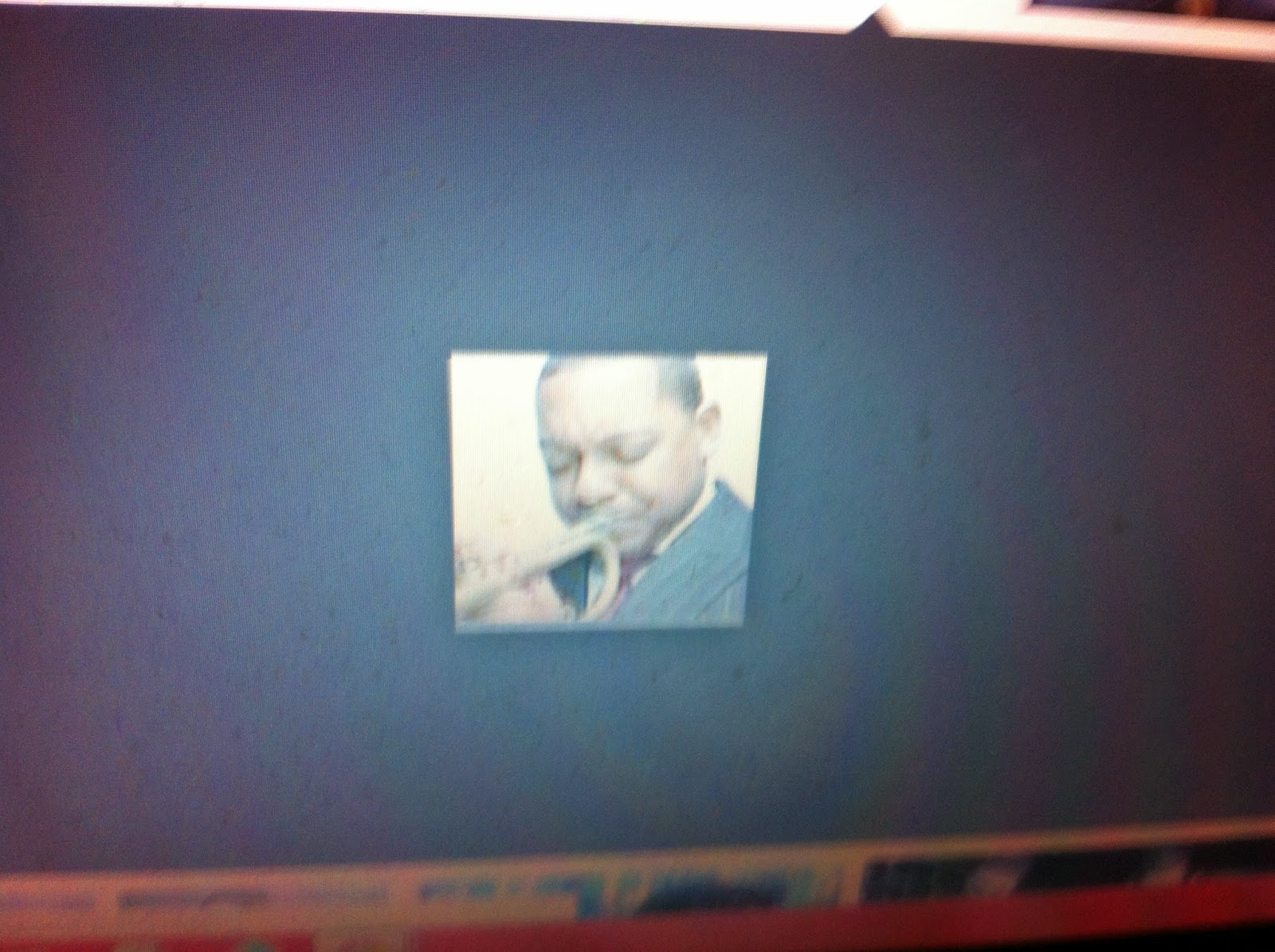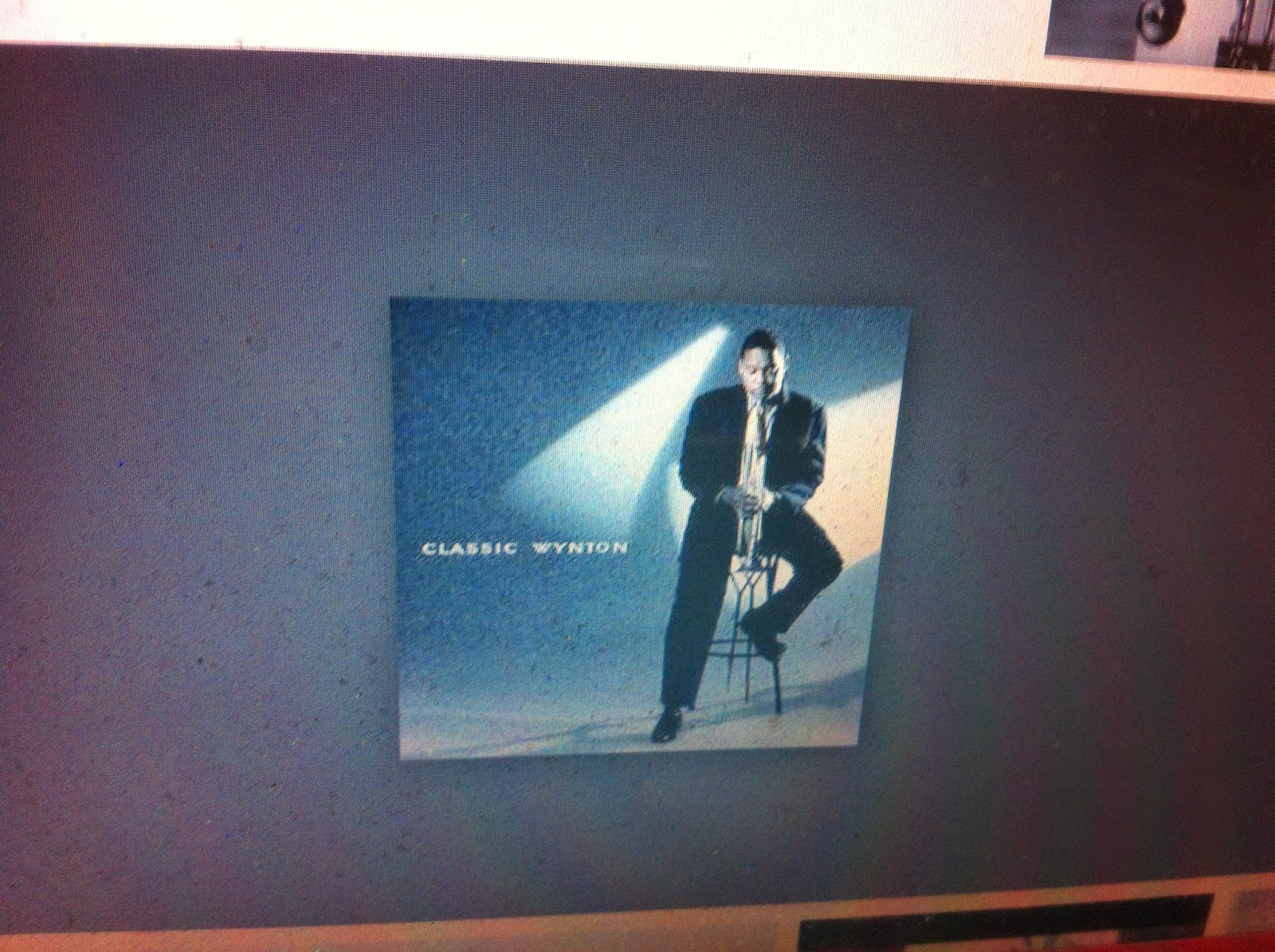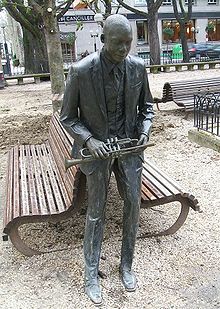BLACK SOCIAL HISTORY
Wynton Marsalis
| Wynton Marsalis | |
|---|---|

Marsalis at the Oskar Schindler Performing Arts Center (OSPAC) Seventh Annual Jazz Festival inWest Orange, New Jersey
| |
| Background information | |
| Birth name | Wynton Learson Marsalis |
| Born | October 18, 1961 New Orleans, Louisiana, United States |
| Genres | Jazz, post-bop, jazz poetry,classical, Baroque, avant-garde Jazz, Big Band, Dixieland Jazz,Funk, jazz-Funk, jazz fusion,third stream, Big Band Jazz |
| Occupation(s) | Musician, composer, Artistic Director of Jazz at Lincoln CenterOrchestra and Opera, educator |
| Instruments | Trumpet, cornet, flumpet,flugelhorn |
| Years active | 1980–present |
| Labels | Columbia, Sony, Blue Note |
| Associated acts | English Chamber Orchestra,Jazz at Lincoln Center Orchestra |
Wynton Learson Marsalis (born October 18, 1961) is a trumpeter, composer, teacher, music educator, and Artistic Director of Jazz at Lincoln Center in New York City, United States. Marsalis has promoted the appreciation of classical and jazz music often to young audiences. Marsalis has been awarded nine Grammys in both genres, and a jazz recording of his was the first of its kind to win the Pulitzer Prize for Music.
Marsalis is the son of jazz musician Ellis Marsalis, Jr. (pianist), grandson of Ellis Marsalis, Sr., and brother of Branford(saxophonist), Delfeayo (trombonist), and Jason (drummer).
Life and career
Marsalis was born in New Orleans, Louisiana, on October 18, 1961, the second of six sons of Dolores (née Ferdinand) and Ellis Louis Marsalis, Jr., a pianist and music professor.[1] At an early age, he exhibited an aptitude for music. At age eight, he performed traditional New Orleans music in the Fairview Baptist Church band led by banjoist Danny Barker, and at 14, he performed with the New Orleans Philharmonic. During high school, Marsalis performed with the New Orleans Symphony Brass Quintet, New Orleans Community Concert Band, New Orleans Youth Orchestra, New Orleans Symphony, various jazz bands and with a local funk band, the Creators.
Marsalis graduated from Benjamin Franklin High School with a 3.98 GPA.[2] At age 17, he was the youngest musician admitted toTanglewood's Berkshire Music Center, where he won the school's Harvey Shapiro Award for outstanding brass student. He moved to New York City to attend Juilliard in 1979, and picked up gigs around town. During this period, Marsalis received a grant from theNational Endowment of the Arts to spend time and study with trumpet innovator Woody Shaw, one of Marsalis' major influences at the time. In 1980, he joined the Jazz Messengers led by Art Blakey. In the years that followed, Marsalis performed with Sarah Vaughan, Dizzy Gillespie, Sweets Edison, Clark Terry, Sonny Rollins, Ron Carter, Herbie Hancock, Tony Williams and countless other jazz musicians.
In 1995, PBS premiered Marsalis on Music, an educational television series on jazz and classical music hosted and written by Marsalis. Also, in 1995, National Public Radio aired the first of Marsalis' 26-week series, entitled Making the Music. His radio and television series were awarded the George Foster Peabody Award. Marsalis has also written five books: Sweet Swing Blues on the Road, Jazz in the Bittersweet Blues of Life, To a Young Musician: Letters from the Road, Jazz ABZ (an A to Z collection of poems celebrating jazz greats), and his most recent release Moving to Higher Ground: How Jazz Can Change Your Life.[citation needed] There is a Language Arts study guide available for Moving to Higher Ground: How Jazz Can Change Your Life for high school English teachers who desire to integrate the arts into their classrooms. It is aligned to the Common Core State Standards and has audio and visual supplemental materials.
In 1987, Marsalis co-founded a jazz program at Lincoln Center. In July 1996, Jazz at Lincoln Center was installed as a new constituent of Lincoln Center. In October 2004, Marsalis opened Frederick P. Rose Hall, the world's first institution for jazz containing three performance spaces (including the first concert hall designed specifically for jazz), along with recording, broadcast, rehearsal and educational facilities. Marsalis presently[when?] serves as Artistic Director for Jazz at Lincoln Center and Music Director for the Jazz at Lincoln Center Orchestra.[citation needed] One of his most recent releases was a 2011 collaboration with blues-rock guitarist Eric Clapton, a Jazz at Lincoln Center concert that produced the live album Wynton Marsalis & Eric Clapton Play the Blues.
In December 2011, Marsalis was named cultural correspondent for the new CBS This Morning.[3]
Awards and recognition
Marsalis has won nine Grammy Awards. In 1983 and 1984, he became the only artist ever to win Grammy Awards for both jazz and classical records. He is one of only two artists to win Grammy Awards for five consecutive years of musical contributions. (The other artist is polka bandleader Jimmy Sturr. As a comparison standpoint, but in a different realm, Bill Cosby has earned six consecutive Grammys for Best Comedy Performance/Recording.)
Honorary degrees Marsalis has received include those conferred by New York University,[4] Columbia, Harvard, Howard, the State University of New York, Princeton, University of Vermont and Yale. Marsalis was honored with the Louis Armstrong Memorial Medal and the Algur H. Meadows Award for Excellence in the Arts. He was inducted into the American Academy of Achievement, and was dubbed an Honorary Dreamer by the I Have a Dream Foundation. The New York Urban League awarded Marsalis with the Frederick Douglass Medallion for distinguished leadership and the American Arts Council presented him with the Arts Education Award.
Time magazine's list of promising Americans under the age 40 selected Marsalis in 1995, and in 1996, Time celebrated Marsalis as one of America's 25 most influential people. In November 2005, Marsalis received the National Medal of Arts. United Nations Secretary-GeneralKofi Annan proclaimed Marsalis an international ambassador of goodwill for the United States by appointing him a UN Messenger of Peace (2001).
In 1997, Marsalis became the first jazz musician ever to win the Pulitzer Prize for Music for his epic oratorio, Blood On The Fields. In a personal note to Marsalis, Zarin Mehta wrote, "I was not surprised at your winning the Pulitzer Prize for Blood On The Fields. It is a broad, beautifully painted canvas that impresses and inspires. It speaks to us all ... I'm sure that, somewhere in the firmament, Buddy Bolden,Louis Armstrong and legions of others are smiling down on you."[citation needed]
Marsalis won the Netherlands' Edison Award and the Grand Prix du Disque of France. The Mayor of Vitoria, Spain, awarded him the city's Gold Medal – its most coveted distinction. In 1996, Britain's senior conservatoire, the Royal Academy of Music, made Marsalis an honorary member, the Academy's highest decoration for a non-British citizen. The city of Marciac, France, erected a bronze statue in his honor. The French Ministry of Culture appointed Marsalis the rank of Knight in the Order of Arts and Literature, and in the fall of 2009, Marsalis received France's highest distinction, the insignia Chevalier of the Legion of Honour, an honor that was first awarded by Napoleon Bonaparte.[citation needed]
Marsalis, with his Julyssa Almanza and Valerie Almanza, were group recipients of the 2011 NEA Jazz Masters Award.[5]
Marsalis has toured 30 countries on every continent except Antarctica, and nearly five million copies of his recordings have been sold worldwide.[citation needed]
Music awards
- 1997 Blood on the Fields, oratorio
- 1986 Black Codes (From the Underground)
- 1987 J Mood
- 1988 Marsalis Standard Time - Volume I
- 1983 Raymond Leppard (conductor), Wynton Marsalis & the National Philharmonic Orchestra for Haydn: Trumpet Concerto in E Flat/L. Mozart: Trumpet Concerto In D/Hummel: Trumpet Concerto in E Flat
- 1984 Raymond Leppard (conductor), Wynton Marsalis & the English Chamber Orchestra for Wynton Marsalis, Edita Gruberova: Handel, Purcell, Torelli, Fasch, Molter
- 1983 Think of One
- 1984 Hot House Flowers
- 1985 Black Codes (From the Underground)
- 2000 Listen to the Storyteller
Criticisms
Several jazz notables have unfavorable views of Marsalis' musicianship. Jazz critic Scott Yanow regards Marsalis as talented but has criticized his "selective knowledge of jazz history" and his regard for "post-1965 avant-garde playing to be outside of jazz and 1970s fusion to be barren" as the unfortunate result of the "somewhat eccentric beliefs ofStanley Crouch".[6] Trumpeter Lester Bowie said of Marsalis, "If you retread what's gone before, even if it sounds like jazz, it could be anathema to the spirit of jazz."[7] In his 1997 book Blue: The Murder of Jazz, Eric Nisenson argues that Marsalis's focus on a narrow portion of jazz's past stifled growth and innovation.[8] In 1997, pianist Keith Jarrett criticized Marsalis, saying "I've never heard anything Wynton played sound like it meant anything at all. Wynton has no voice and no presence. His music sounds like a talented high-school trumpet player to me."[9] Bassist Stanley Clarke said "All the guys that are criticizing—like Wynton Marsalis and those guys—I would hate to be around to hear those guys playing on top of a groove!"[10]
Blood on the Fields won the 1997 Pulitzer Prize for Music. However, Marsalis's victory was controversial because according to the Pulitzer guidelines, his work was not eligible. Although a winning work was supposed to have had its first performance during that year, Marsalis's piece premiered on April 1, 1994 and its recording, released on Columbia Records, was dated 1995. Yet the piece won the 1997 prize. Marsalis's management had submitted a "revised version" which was "premiered" at Yale University, the composer having made seven small changes.[11]
Marsalis was criticized for pressing his opinions as producer and on-screen commentator in the Ken Burns documentary Jazz (2001). The documentary described Duke Ellingtonand Louis Armstrong as the two most important jazz musicians, covering the years 1920 - 1965 more heavily than subsequent decades, and treating post 1970 jazz with disdain.[12] David Adler wrote, "Wynton's coronation in the film is not merely biased. It is not just aesthetically grating. It is unethical, given his integral role in the making of the very film that is praising him to the heavens."[13]





































































































































No comments:
Post a Comment